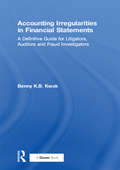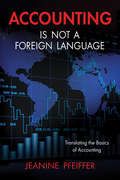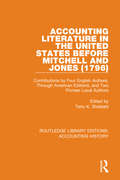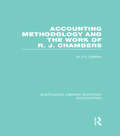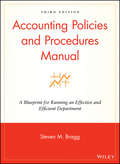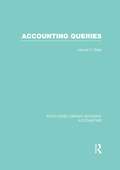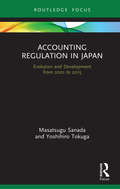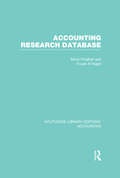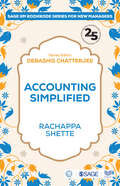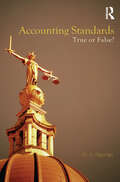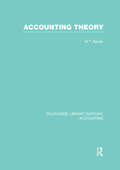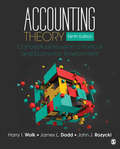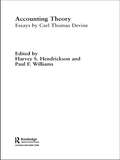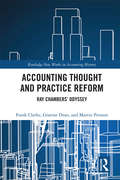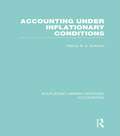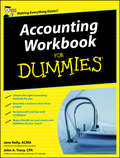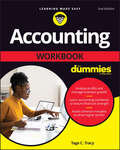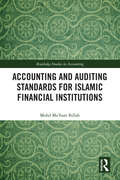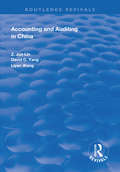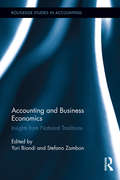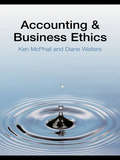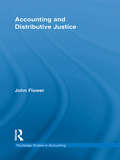- Table View
- List View
Accounting Irregularities in Financial Statements: A Definitive Guide for Litigators, Auditors and Fraud Investigators
by Benny K.B. KwokAccounting irregularities are at the heart of those kinds of frauds that hit financial statements and include misstatement, misclassification as well as misrepresentation. In essence, they involve manipulation of accounting data, description or disclosure in order to distort the true financial picture of the organization in question. This book provides an in-depth practical reference, designed for litigators, investigators, auditors, accountants and other professionals who need to understand and combat accounting irregularities and to uphold the integrity of financial statements. Regulators will find this book an essential source of ideas and references when considering reforms. Educators and students will see this book as an alternative, inspiring way of understanding accounting and how to stay alert for accounting irregularities. The first two chapters introduce the basics of accounting irregularities in the context of the financial reporting environments, and generally accepted accounting principles in the UK and Hong Kong. Perpetrators often seek ways to creating financial illusions in four common directions - selling more, costing less, owning more and owing less as discussed in Chapters 3 to 6. The seventh chapter considers various ways that perpetrators manipulate the classification and disclosure of financial statements. Chapter 8 explores three scenarios of accounting irregularities - tax evasion, theft and commercial dispute. The concluding chapter sets out the deterrents to accounting irregularities in two dimensions. At the micro-level, deterrents are implemented within the authority of the organization in question, whilst the macro-level deterrents refer to the external environment beyond the controls of any individual organization.
Accounting Is Not a Foreign Language: Translating the Basics of Accounting (Accounting Is Not A Foreign Language Ser.)
by Jeanine PfeifferA seasoned accountant offers a simple approach to the basics of accounting and shows readers how to make accounting work for them.Does accounting seem to be all Greek to you? Many small business owners have the passion and expertise necessary to run their businesses but keeping journals and tallying accounts can be mystifying. Fear not! In Accounting Is Not a Foreign Language, Jeanine Pfeiffer guides readers through the fundamentals and complexities of accounting, using clear and straightforward terms to explain what all those numbers actually mean.Pfeiffer, an accountant with twenty years of experience in both small and large business accounting and the CEO of Pfeiffers Accounting and Consulting, LLC, offers this book to assist small business owners in keeping accurate and updated accounts and establishing a basic understanding of accounting. From debits and credits to income statements, Pfeiffer demonstrates just how to make accounting work for you, laying a foundation for future growth and profit. Her LINKS approach connects the disparate parts of accounting together in an easy-to-follow manner, helping readers see that in accounting, everything is linked together—linked to the overall business.Filled with helpful resources such as sample journal entries, receipts, and invoices, as well as detailed chapter summaries, Pfeiffer’s clear and matter-of-fact explanations lift the shroud of mystery from small business accounting, revealing a simple step-by-step process to building a better business. After reading Accounting Is Not a Foreign Language, you’ll be speaking the language of accounting fluently—and translating your business accounting into solid profit.Praise for Accounting Is Not a Foreign Language“Finally, a book for all of us non-accountants who have careers in the accounting profession. Simply put, this book makes the complex understandable. It’s a fact that administrative professionals working in the public accounting profession often struggle to understand the technical aspects of what accountants do for their clients. I recommend Accounting Is Not a Foreign Language to all of the marketing, human resources, technology, and other administrative professionals working in the public accounting world. Read this book and just imagine what we could accomplish for our firms if we all spoke the same language.” —Eric Majchrzak, Director of Marketing, Freed Maxick CPAs; Board member of the Association for Accounting Marketing; Named in Accounting Today’s list of the Top 100 Most Influential People
Accounting Literature in the United States Before Mitchell and Jones: Contributions by Four English Authors, Through American Editions, and Two Pioneer Local Authors (Routledge Library Editions: Accounting History #4)
by Terry. K. SheldahlThis book, first published in 1989, reproduces and assesses several key works from the beginnings of the profession of accountancy. The articles featured partly formed the origins of American accountancy, and as such are extremely valuable reference resources for the historian of the profession.
Accounting Methodology and the Work of R. J. Chambers (Routledge Library Editions: Accounting)
by M.j.r. GaffikinThis study traces the development of methodology in philosophy and economics with particular focus on the work of Raymond Chambers. As well as analysing the reception on methodological lines, afforded his work by both academic and professional communities, the volume discusses some significant contributions by French and German scholars to the debate about why scientific communities have accepted some theories and rejected others.
Accounting Policies and Procedures Manual
by Steven M. BraggNow in a fifth edition, Accounting Policies and Procedures Manual: A Blueprint for Running an Effective and Efficient Department is a how-to guide on creating an effective and efficient accounting department policies and procedures manual.Written by Steven Bragg, the foremost authority in accounting and controllership issues, the new edition includes:A new, complimentary Web site providing readers with the foundation for creating or enhancing their accounting department policies and procedures manualMore coverage of accounting procedures including inventory, billing, cash receipts, pricing, order entry, credit, collections, sales returns, capital budgeting, cash forecasting, payroll, and closing the booksAccounting Policies and Procedures Manual is the tool every accounting department needs to regularize and systematize its procedures to match the best in the industry.
Accounting Queries: Accounting: Accounting Queries (Routledge Library Editions: Accounting)
by Harold C. EdeyThese reprints of articles, lectures and talks cover the period 1949 – 1980. They chart the development of the academic subject of accountancy and illustrate some of the matters which were concerning the academics at the London School of Economics at a time when academic accountancy was still in its infancy.
Accounting Regulation in Japan: Evolution and Development from 2001 to 2015 (Routledge Focus on Accounting and Auditing)
by Masatsugu Sanada Yoshihiro TokugaLittle has been published on accounting standards in Japan and how they have developed. The purpose of this study is to construct a historical narrative of the interplay between accounting standards in Japan and theories of regulation. The authors demonstrate that delegation of the authority for accounting standard setting to the private sector in Japan is incomplete, and thus, the role of the public sector remains important. In the discussion about IFRS implementation in Japan, the movement in the United States, industry opinions, and ideological conflict between fair value versus historical cost play important roles. These elements combined led to the ambiguous coexistence of four sets of accounting standards in Japan. First, by using an explaining-outcome process-tracing method, the authors examine how these sets of standards occurred and explore the significance of each. Second, they deliver an explanation of this unique coexistence through the lens of theories of regulation. In doing so, they provide an overview of the history of the recent development of accounting regulation in Japan and offer an up-to-date response to current affairs or policy debates in Japan that have been rapidly changing. Providing a rare insight into accounting regulation in Japan, an IFRS non-application country, this concise text will be of great interest to researchers and advanced students in international accounting and accounting regulation.
Accounting Research Database (Routledge Library Editions: Accounting)
by Bimal Prodhan Fouad Al NajjarAn invaluable tool for the researcher in accounting history, this comprehensive database, structured in an accessible way, analyses over 1,200 articles from four mainstream accounting journals from the UK and USA. Each article (originally published between 1976 and 1985) was analysed in two ways: first, into empirical or conceptual categories and second, into one of twenty topic areas. The journals covered are Journal of Accounting Research, The Accounting Review, Accounting and Business Research and Journal of Business Finance and Accounting.
Accounting Simplified (SAGE IIM-Kozhikode Series for New Managers)
by Rachappa ShetteAccounting Simplified is a manager’s guide to accounting for making effective corporate decisions. The accountant’s lingo consists of difficult language and financial jargons existing in the mainstream literature of finance. Understanding P&Ls, costing, balance sheet, income and cash flows statements for a fresh graduate or a rookie manager from a non-financial background can be challenging, leading to total disinterest in the area or dependency on finance managers or even erroneous decision-making. This book will help managers in understanding the analysis of balance sheet, statement of profit and loss and cash flows statement. It includes case studies of financial statements of major listed companies and checklists to understand the financial health and performance of the organization. The book will help young managers, accounting executives and academicians use accounting insights for improving business performance.
Accounting Standards: True or False?
by R.A. RaymanFollowing a spate of high-profile financial scandals (including Enron, WorldCom, and Parmalat), the quality of financial information has come under increasing scrutiny. Many of the accounting standards being imposed on the profession by regulators and standard-setting bodies are now attracting criticism from the business community and the accountancy profession itself. In this book, Anthony Rayman traces a fundamental flaw in the conventional academic wisdom back to the nineteenth century, and proposes an alternative conceptual framework. He argues that effective corporate governance can be achieved, not by expensive and counterproductive regulations (like the US Sarbanes-Oxley Act and some International Accounting Standards), but by an enhanced accounting information system that exposes corporate management to the full rigour of market forces.
Accounting Theory (Routledge Library Editions: Accounting)
by W. T. BaxterDiscussing various aspects of accounting theory by collecting diverse pieces originally published between 1978 and 1994, this volume asks and answers the following questions: What do the figures from a company’s report actually mean? To what uses can they properly be put? Could they be improved? What effect have they on the outside world?
Accounting Theory: Conceptual Issues in a Political and Economic Environment
by Harry I. Wolk James L. Dodd John J. RozyckiThis updated Ninth Edition of Accounting Theory: Conceptual Issues in a Political and Economic Environment continues to be one of the most relevant and comprehensive texts on accounting theory. Authors Harry I. Wolk, James L. Dodd, John J. Rozycki provide a critical overview of accounting as a whole as well as touch on the financial issues in economic and political contexts, providing readers with an applied understanding of how current United States accounting standards were derived and where we might be headed in the future. Readers will find learning tools such as questions, cases, problems and writing assignments to solidify their understanding of accounting theory and gain new insights into this evolving field.
Accounting Theory: Conceptual Issues in a Political and Economic Environment
by Harry I. Wolk James L. Dodd John J. RozyckiThis updated Ninth Edition of Accounting Theory: Conceptual Issues in a Political and Economic Environment continues to be one of the most relevant and comprehensive texts on accounting theory. Authors Harry I. Wolk, James L. Dodd, John J. Rozycki provide a critical overview of accounting as a whole as well as touch on the financial issues in economic and political contexts, providing readers with an applied understanding of how current United States accounting standards were derived and where we might be headed in the future. Readers will find learning tools such as questions, cases, problems and writing assignments to solidify their understanding of accounting theory and gain new insights into this evolving field.
Accounting Theory: Essays by Carl Thomas Devine (New Works In Accounting History Ser.)
by Harvey S. Hendrickson Paul F. WilliamsOne of the outstanding accounting theoreticians of the twentieth century, Carl Thomas Devine exhibited a breadth and depth of knowledge few in the field of accounting have equalled. This book collects together eight previously unpublished essays on accounting theory written by Professor Devine.Professor Devine passed away in 1998, prior to the sign
Accounting Thought and Practice Reform: Ray Chambers’ Odyssey (Routledge New Works in Accounting History)
by Frank Clarke Graeme William Dean Martin E PerssonRaymond John Chambers was born just over a century ago on 16 November 1917. It is more than fifty years since his first classic, Accounting, Evaluation and Economic Behavior, was published, more than forty since Securities and Obscurities: Reform of the Law of Company Accounts (republished in 1980 as Accounting in Disarray) and over twenty since the unique An Accounting Thesaurus: Five Hundred Years of Accounting. They are drawn upon extensively in this biography of Chambers’ intellectual contributions, as are other of his published works. Importantly, we also analyze archival correspondence not previously examined. While Chambers provided several bibliographical summaries of his work, without the benefits of reviewing and interspersing the text with correspondence materials from the Chambers Archive this study would lack an appreciation of the impact of his early childhood, and nuances related to his practical (including numerous consultancies) and academic experiences. The ‘semi-biographical narrative’ codifies article and editorial length exercises by the authors drawing on parts of the archive related to theory development, measurement and communication. Other parts are also examined. This allows us to respond to those critics who claim his reforms were naive. They further reveal a man of theory and practice, whose theoretical ideas were solidly grounded on observations from his myriad interests and experiences. Many of his practical experiences have not been examined previously. This approach and the first book-length biography differentiates this work from earlier analyses of Chambers’ contribution to the accounting literature. We provide evidence to support the continued push for the reforms he proposed to accepted accounting thought and practice to ensure accounting is the serviceable technology so admired by Pacioli, Da Vinci and many other Renaissance pioneers. It will be of interest to researchers, educators, practitioners and regulators alike.
Accounting Turbulence at Boeing
by David Lane Suraj Srinivasan Jonas Heese James BarnettUnlike its rival Airbus, Boeing used a practice called program accounting to record its commercial aircraft expenses since the 1980s. Program accounting allowed Boeing to expense estimated average costs instead of the actual production costs of an aircraft. This practice lowered the effect of the initially high costs of manufacturing new aircraft models on Boeing's profitability and reflected potential learning efficiencies that could drive down manufacturing costs over time. By 2016, Boeing had deferred about $27 billion in production costs related to its 787 program. If Boeing had been forced to expense these costs, it would have shown profits of $1.4 billion between 2012 and 2016 instead of $25.2 billion, raising questions about Boeing's true profitability.
Accounting Under Inflationary Conditions (Routledge Library Editions: Accounting)
by Patrick KirkmanWhen first published this volume represented the first concise, accessible UK text that explained the very complex changes that could be involved in an inflation accounting system. The new edition of the book (1978) was restructured and rewritten, with a substantial amount of material added so that it provides a comprehensive and accurate picture of the inflation accounting issues of the 1970s.
Accounting Workbook For Dummies
by Jane Kelly John A. TracyWant to become an accountant? Own a small business but need help balancing your books? Worried about managing your finances under the cloud of the recession?This hands-on workbook gets you up to speed with the basics of business accounting, including reading financial reports, establishing budgets, controlling cash flow, and making wise financial decisions. The question and answer sections encourage you to find your own solutions to challenging accounting problems - and there's plenty of space to scribble your workings out! Accounting Workbook For Dummies is the only book that makes truly light work of the financial fundamentals that many businesspeople try to bluff their way through every day.Accounting Workbook For Dummies, UK Edition covers:Part I: Business Accounting Basics Chapter 1: Elements of Business Accounting Chapter 2: Financial Effects of Transactions Chapter 3: Getting Started in the Bookkeeping Cycle Chapter 4: The Bookkeeping Cycle: Adjusting and Closing Entries Part II: Preparing Financial Statements Chapter 5: The Effects and Reporting of Profit Chapter 6: Reporting Financial Condition in the Balance Sheet Chapter 7: Coupling the Profit & Loss Statement and Balance Sheet Chapter 8: Reporting Cash Flows and Changes in Owners' Equity Chapter 9: Choosing Accounting Methods Part III: Managerial, Manufacturing, and Capital Accounting Chapter 10: Analysing Profit Behavior Chapter 11: Manufacturing Cost Accounting Chapter 12: Figuring Out Interest and Return on Investment Part IV: The Part of Tens Chapter 13: Ten Things You Should Know About Business Financial Statements Chapter 14: A Ten-Point Checklist for Management Accountants Main changes in the UK edition include:UK Accounting practiceCurrencyUK institutions - Inland Revenue and Customs and Excise etcNational Insurance, PAYEUK taxation and VATPartnerships and Limited company informationUK legal practiceUK specific formsUK specific case studies
Accounting Workbook For Dummies
by Tage C. TracyNumber nightmares in accounting? No more! The numbers are clear: the need for accountants is not only strong, but on the rise. With job growth projected to increase by 7% over the next 10 years, there&’s no time like the present to join this growing—and profitable—profession. Accounting Workbook For Dummies, 2nd Edition gives you the hands-on instruction you need to understand complicated concepts through demonstration problems, practice worksheets. and spreadsheets. Understand the role of accountants versus bookkeepers Develop knowledge to establish and maintain high quality accounting systems Dip your toes into accounting in the digital age Learn to properly interpret financial statements and reports Generate income statements, balance sheets, and cash flow statements Expand your knowledge on sources of business capital Learn how to improve profits and manage costs Understanding the intricacies of accounting has never been easier as in today&’s rapid-fire global economy, accountants have never been more important—it&’s all in your hands with this plain-English workbook!
Accounting and Auditing Standards for Islamic Financial Institutions (Routledge Studies in Accounting)
by Mohd Ma'Sum BillahWhile accounting and audit functions are significantly regulated and standardized in conventional financial industries and activities, through the implementation of International Accounting Standards, and International Financial Reporting Standards, as well as other international, regional, and local regulations, this is not the case for Islamic financial organizations. Rather than having their own set of comprehensive accounting or auditing standards or policies, these are based, in some cases, on the Accounting and Auditing Organization for Islamic Financial Institutions (AAIOFI), the Islamic Financial Services Board (IFSB)’s standards and Shari’ah based local policies. This book is a timely and comprehensive overview of accounting and auditing standards within the doctrine of Shari’ah. It offers a significant contribution to the field and a wealth of technical know-how. It analyzes Islamic accounting and auditing both in theory and practice and from a distinctly international perspective. The chapters are arranged in a systematic and logical way making it easily accessible and engaging. The book evaluates the existing standards and widens the scope of the discourse to include Maqasid al-Shari’ah, Islamic accounting and audit models and standards, as well as, offering practical policy recommendations. The author presents a Shari’ah justified solution to Islamic Accounting and Audit and offers guidance on overcoming the challenges to implementing Islamic Accounting and Auditing Standards. The book is a unique and exhaustive guide and, as such, will be an invaluable resource for academics, researchers, students, policymakers, as well as, practitioners in accounting and auditing firms and financial institutions.
Accounting and Auditing in China (Routledge Revivals)
by Z. Jun Lin David C. Yang Liyan WangFirst published in 1998, this book provides an updated introduction to accounting and auditing in China, incorporating the most recent developments up to June 1997. It covers all major aspects of Chinese accounting and auditing, including accounting administrative systems, qualifications and responsibility of Chinese accountants, accounting regulations or standards setting, cost and managerial accounting, financial reporting, statutory audit and public accounting, accounting for governments and non-profit organizations, business financing and taxation systems, EDP application in accounting, accounting education and research etc. Some of the main accounting and auditing legislation and standards are complied in the Appendix. The book will be an informative reference to readers, both business executives and professionals, outside of China. It can also be used as a textbook or teaching supplement for Universities and Colleges.
Accounting and Business Economics: Insights from National Traditions (Routledge Studies in Accounting)
by Yuri Biondi Stefano ZambonThe recent financial crisis has sparked debates surrounding the nature and role of accounting in informing capital markets and regulatory bodies about the financial performance and position of a firm. These debates have drawn attention to the broader implications of accounting for the economy and society. Accounting and Business Economics brings together leading international scholars to examine the current state of accounting theory and its fundamental connection with the economics and finance of firms, viewing the business entity from not only accounting, but also national, economic, social, political, juridical, anthropological, and moral points of view.
Accounting and Business Ethics: An Introduction
by Diane Walters Ken McPhailDespite the enormous impact of various accounting scandals on the accounting profession, the general malaise amongst the profession more broadly, and the significant legislative and institutional reforms that have taken place as a result, there are still surprisingly few textbooks on accounting ethics. This concise introductory text takes a broad view of ethics and accounting, taking into account contemporary social trends, such as globalization and terrorism. Rather than delineating codes of professional conduct, this text pushes the reader towards an understanding of the nature of ethical dilemmas and the factors that influence the ways in which accountants frame ethical questions. The book is divided into two parts. The first part focuses on developing thinking about the different kinds of ethical questions that could be posed in relation to accounting. The second part focuses more explicitly on accounting practice, exploring the ethical function of accounting in relation to the market economy, ethics in relation to the accounting profession, and the ethics of the international accounting harmonization project. Accounting and Business Ethics is a compact introduction aimed at both students and practitioners who want to understand more about the ethics of accounting.
Accounting and Distributive Justice (Routledge Studies in Accounting)
by John FlowerAccounting and Distributive Justice challenges the basic assumptions on which the current practice of financial reporting is based. It argues that the objective of financial reporting should be to contribute to the achievement of distributive justice and not the optimal allocation of resources as in the traditional capitalist paradigm. It explains in non-technical terms the principle philosophical theories of justice and argues that a firm has a moral responsibility to seek distributive justice in its dealings with its shareholders, employees, suppliers, customers, and other people with whom it has dealings, who are considered to be the firm’s stakeholders. The book introduces concepts of distributive justice to accountants and provokes them into reflecting on how the discipline of accounting can best serve the cause of justice. Accounting and Distributive Justice provides both a philosophical foundation and a practical game plan for the future of a more sustainable accounting practice.
Accounting and Emancipation: Some Critical Interventions (Routledge Studies In Accounting Ser. #Vol. 3)
by Jim Haslam Dr Sonja Gallhofer Sonja Gallhofer Professor Jim HaslamAccounting is a social practice: it should be evaluated in terms of its contribution to a notion of social well-being. In order to do this, this book elaborates a critique of contemporary accounting. The authors encourage those with a close interest in accounting to make the search for a more emancipatory and enabling accounting a core area of thei
